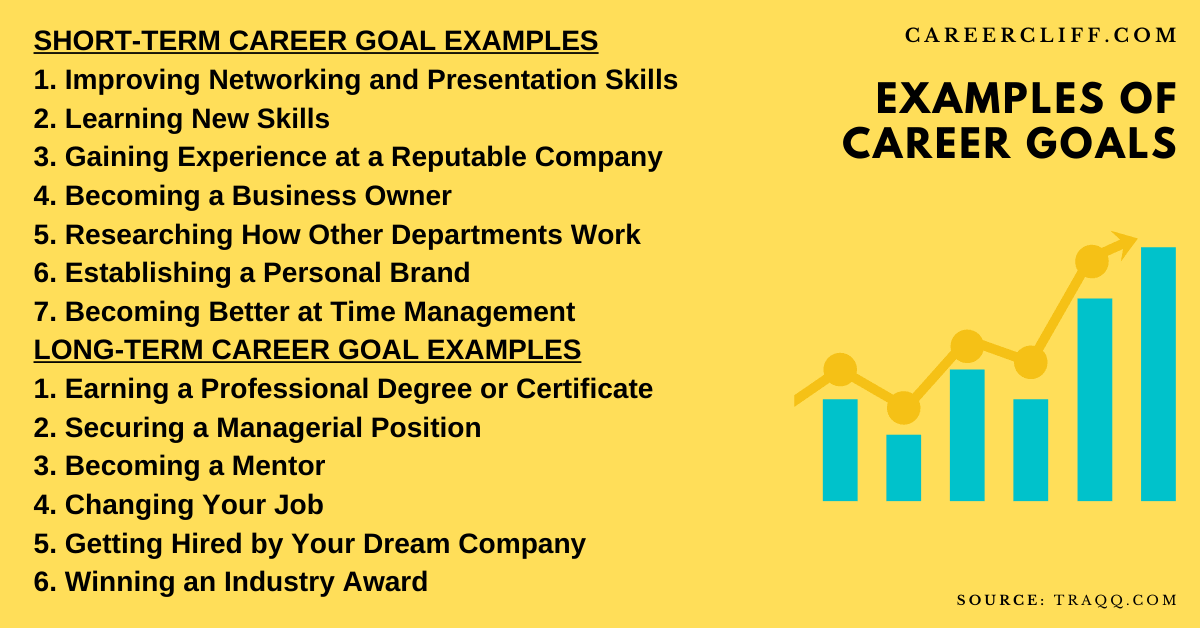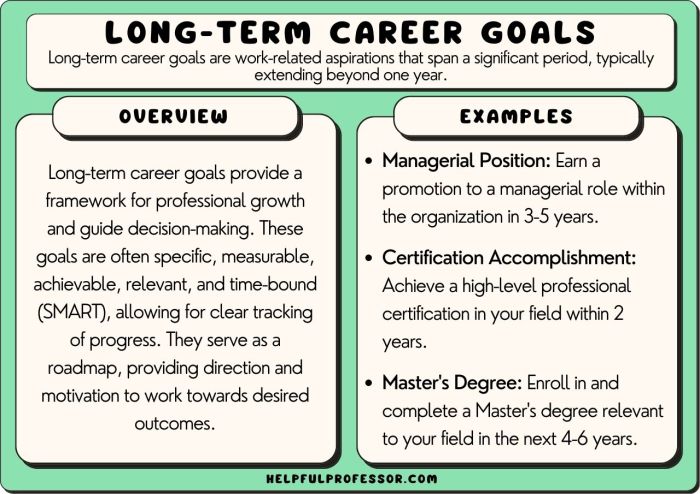Career Development Goals are key to unlocking your full potential and paving the way for a successful future. Imagine a roadmap filled with possibilities and opportunities, guiding you towards your dream career with precision and clarity.
In this journey of self-discovery and growth, setting clear goals acts as your compass, keeping you on track and motivated to reach new heights.
Importance of Career Development Goals

Setting clear career development goals is crucial for professional growth as it provides a roadmap for individuals to progress in their careers. Without defined goals, it can be challenging to measure success and track achievements over time.
Enhanced Motivation and Focus
- Having well-defined career goals can enhance motivation in the workplace by giving individuals a sense of purpose and direction. When employees know what they are working towards, they are more likely to stay engaged and focused on their tasks.
- Goals also help employees prioritize their work and make decisions that align with their long-term objectives. This can lead to increased productivity and efficiency in achieving desired outcomes.
Long-Term Benefits, Career Development Goals
- Aligning personal aspirations with career development objectives can lead to long-term benefits such as career advancement, increased job satisfaction, and higher levels of fulfillment in one’s professional life.
- By continuously setting and working towards career goals, individuals can stay motivated, adapt to changing circumstances, and remain competitive in their field. This can open up new opportunities for growth and success in the future.
Types of Career Development Goals
In the journey of career development, individuals often set different types of goals to help them progress and succeed in their professional lives. These goals can fall into various categories such as skill-based, promotional, educational, and more. Each category plays a significant role in shaping a person’s career path and helping them achieve their desired outcomes.
Skill-based Career Development Goals
Skill-based career development goals focus on enhancing specific skills or acquiring new ones to excel in a particular field. Short-term goals in this category may include completing a certification course or attending a workshop to improve communication skills. On the other hand, long-term goals could involve becoming proficient in a programming language or mastering project management skills to advance to a higher position.
Promotional Career Development Goals
Promotional career development goals revolve around advancing to higher positions within an organization. Short-term goals could entail taking on leadership roles in projects or cross-training in different departments to gain a broader understanding of the business. Long-term goals may involve securing a managerial position or aiming for an executive role in the company.
Educational Career Development Goals
Educational career development goals focus on furthering education to enhance knowledge and expertise in a specific field. Short-term goals may include enrolling in a professional development course or obtaining a relevant certification. Long-term goals could involve pursuing a master’s degree or obtaining a specialized license to advance in a particular career path.
Balancing Professional and Personal Development Goals
Balancing professional and personal development goals is crucial for overall well-being and success. While professional goals may lead to career advancement and financial stability, personal goals such as maintaining a healthy work-life balance, prioritizing mental health, or nurturing relationships are equally important. Striking a balance between the two ensures holistic growth and fulfillment in both personal and professional aspects of life.
Strategies for Setting Career Development Goals

Setting career development goals is crucial for personal and professional growth. By identifying and articulating your aspirations effectively, creating SMART goals, and engaging in self-assessment and reflection, you can establish a clear path towards success.
Identifying and Articulating Career Aspirations
Before setting career development goals, it’s important to have a clear understanding of your aspirations. Reflect on your interests, values, and skills to identify what you want to achieve in your career. Articulate your goals in a specific and concise manner to ensure clarity and focus.
Creating SMART Goals
When setting career development goals, it’s essential to follow the SMART criteria:
- Specific: Clearly define what you want to accomplish.
- Measurable: Establish criteria to track your progress towards your goals.
- Achievable: Set goals that are realistic and attainable.
- Relevant: Ensure your goals align with your long-term objectives and aspirations.
- Time-bound: Set a deadline for achieving your goals to create a sense of urgency and accountability.
Role of Self-Assessment and Reflection
Self-assessment and reflection play a crucial role in setting meaningful career objectives. Take the time to evaluate your strengths, weaknesses, and areas for growth. Reflect on past experiences and feedback to gain insights into your professional development needs. By understanding yourself better, you can tailor your career goals to align with your unique skills and aspirations.
Achieving Career Development Goals
When it comes to achieving your career development goals, staying motivated and focused is key. It’s important to keep your eye on the prize and remind yourself of why you set those goals in the first place. Here are some strategies to help you stay on track:
Staying Motivated and Focused
One way to stay motivated is to break down your larger career goals into smaller, more manageable tasks. By setting achievable milestones along the way, you can track your progress and celebrate your successes. Additionally, surrounding yourself with supportive and like-minded individuals can help keep you motivated and focused on your goals.
Continuous Learning and Adaptability
Continuous learning and adaptability are crucial in achieving long-term career objectives. The job market is constantly evolving, so it’s essential to stay updated on industry trends and acquire new skills. Being adaptable allows you to navigate changes and challenges in your career path, ultimately helping you reach your goals.
Overcoming Obstacles and Setbacks
It’s inevitable that you’ll face obstacles and setbacks on your journey to achieving your career development goals. When faced with challenges, it’s important to stay resilient and maintain a positive mindset. Seeking feedback, learning from failures, and adjusting your approach can help you overcome obstacles and setbacks, ultimately leading you closer to your goals.
